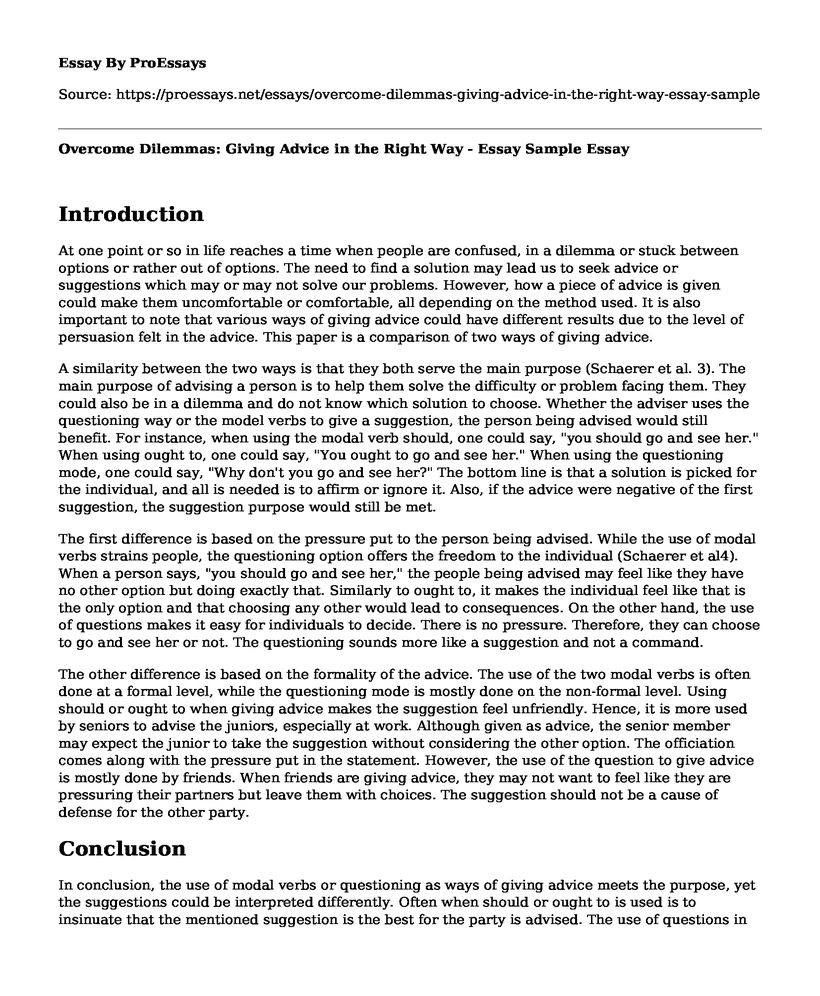Introduction
At one point or so in life reaches a time when people are confused, in a dilemma or stuck between options or rather out of options. The need to find a solution may lead us to seek advice or suggestions which may or may not solve our problems. However, how a piece of advice is given could make them uncomfortable or comfortable, all depending on the method used. It is also important to note that various ways of giving advice could have different results due to the level of persuasion felt in the advice. This paper is a comparison of two ways of giving advice.
A similarity between the two ways is that they both serve the main purpose (Schaerer et al. 3). The main purpose of advising a person is to help them solve the difficulty or problem facing them. They could also be in a dilemma and do not know which solution to choose. Whether the adviser uses the questioning way or the model verbs to give a suggestion, the person being advised would still benefit. For instance, when using the modal verb should, one could say, "you should go and see her." When using ought to, one could say, "You ought to go and see her." When using the questioning mode, one could say, "Why don't you go and see her?" The bottom line is that a solution is picked for the individual, and all is needed is to affirm or ignore it. Also, if the advice were negative of the first suggestion, the suggestion purpose would still be met.
The first difference is based on the pressure put to the person being advised. While the use of modal verbs strains people, the questioning option offers the freedom to the individual (Schaerer et al4). When a person says, "you should go and see her," the people being advised may feel like they have no other option but doing exactly that. Similarly to ought to, it makes the individual feel like that is the only option and that choosing any other would lead to consequences. On the other hand, the use of questions makes it easy for individuals to decide. There is no pressure. Therefore, they can choose to go and see her or not. The questioning sounds more like a suggestion and not a command.
The other difference is based on the formality of the advice. The use of the two modal verbs is often done at a formal level, while the questioning mode is mostly done on the non-formal level. Using should or ought to when giving advice makes the suggestion feel unfriendly. Hence, it is more used by seniors to advise the juniors, especially at work. Although given as advice, the senior member may expect the junior to take the suggestion without considering the other option. The officiation comes along with the pressure put in the statement. However, the use of the question to give advice is mostly done by friends. When friends are giving advice, they may not want to feel like they are pressuring their partners but leave them with choices. The suggestion should not be a cause of defense for the other party.
Conclusion
In conclusion, the use of modal verbs or questioning as ways of giving advice meets the purpose, yet the suggestions could be interpreted differently. Often when should or ought to is used is to insinuate that the mentioned suggestion is the best for the party is advised. The use of questions in making suggestions inserts no pressure on the party. Therefore, they leave people with the comfort of going for the suggestion or ignoring it. Besides, questioning involves no judgment or consequences. Friends often use this mode to advise because it is convenient.
Work Cited
Schaerer, Michael, et al. "Advice giving: A subtle pathway to power." May 2018, pp. 1-26, ink.library.smu.edu.sg/cgi/viewcontent.cgi?article=6779&context=lkcsb_research. Accessed 12 June 2020.
Cite this page
Overcome Dilemmas: Giving Advice in the Right Way - Essay Sample. (2023, Aug 28). Retrieved from https://proessays.net/essays/overcome-dilemmas-giving-advice-in-the-right-way-essay-sample
If you are the original author of this essay and no longer wish to have it published on the ProEssays website, please click below to request its removal:
- Net Neutrality or Internet Freedom: How the Repeal of Net Neutrality May Affect PR
- Observation Work
- Essay Sample on The Importance of Accountability and Punctuality
- How Music in the Modern Era Affect Us as Human Beings Essay Example
- Research Paper on Family and Criminal Law
- Good Communication in Banking Industry Affects Employee Morale, Ethics, and Performance - Research Paper
- Paper on Grandma and Me: Baking Our Way to Connection







